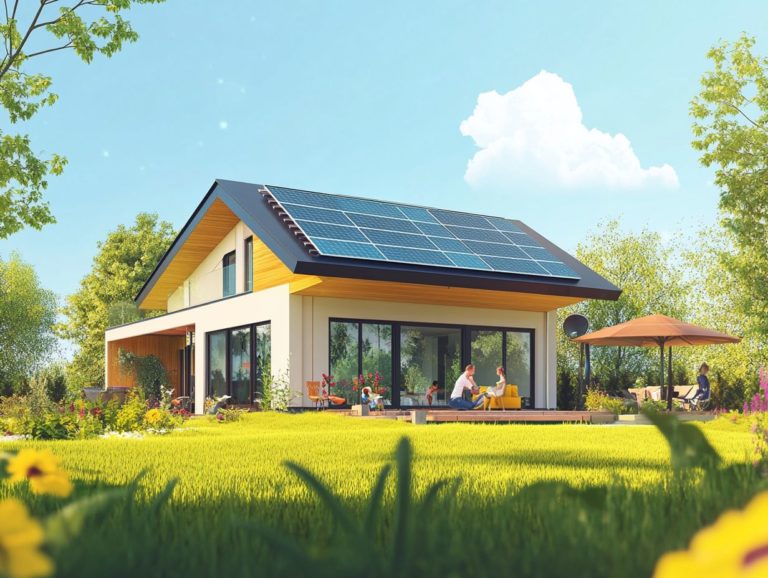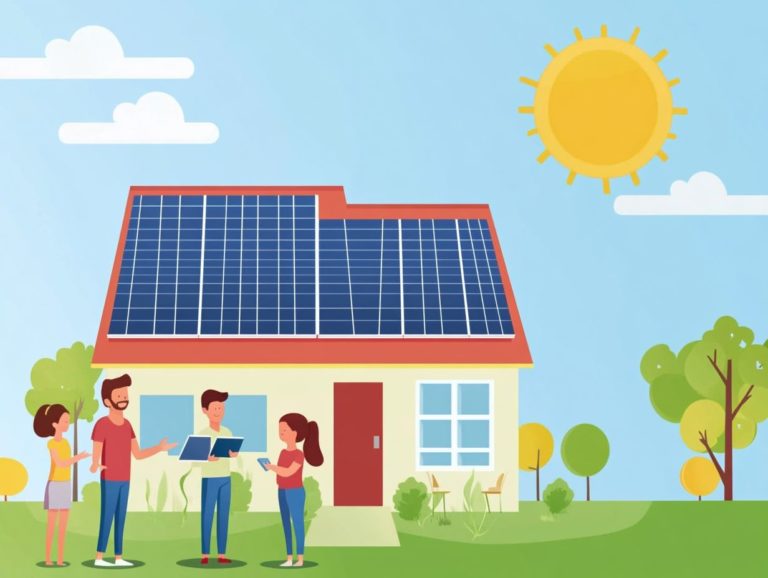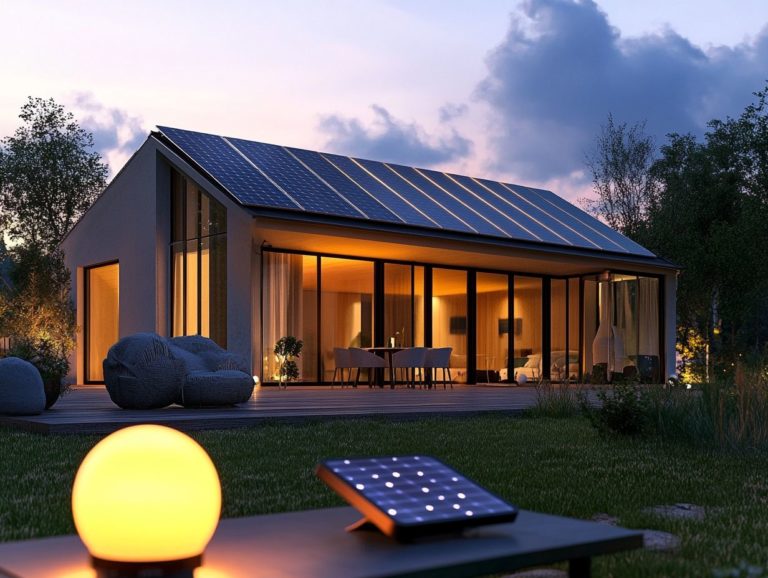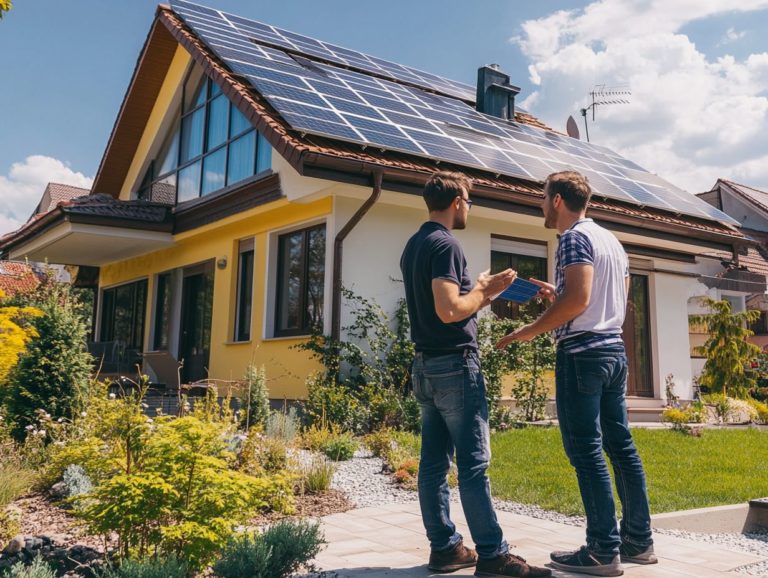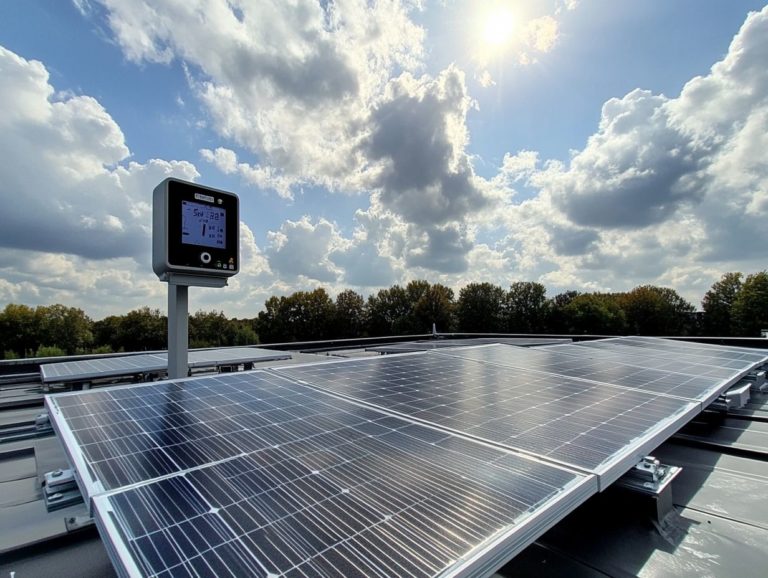“5 Advantages of Solar Energy for Homeowners”
Are you contemplating the shift to solar energy? With a multitude of benefits, it s no surprise that homeowners are increasingly embracing this sustainable solution.
From reducing your electricity bills to enhancing property value, solar energy offers a range of compelling advantages. It contributes to a healthier planet and unlocks government incentives that make the transition even more enticing.
This article delves into five key benefits of solar energy, explains how it operates, and provides tips for homeowners like you to assess if it s the right choice.
Jump in and see how solar energy can transform your life today!
Contents
Key Takeaways:
- Solar energy can significantly reduce your electricity bills, saving you money in the long run.
- Choosing solar energy is an environmentally friendly decision that lessens your carbon footprint, which is the amount of carbon dioxide your activities generate.
- Installing solar panels can raise your home s value, making it a smart investment.
- Government incentives and tax credits make solar energy more affordable and accessible.
- Solar energy provides you with energy independence, allowing you to rely less on traditional energy sources and potentially save money.
1. Lower Electricity Bills
Reducing your electricity bills is a major perk of embracing solar energy solutions. This allows you to cut long-term energy costs while enhancing your financial savings.
By harnessing the sun s power, solar systems can significantly lower your monthly utility expenses. Often, this results in savings ranging from 20% to 50% on energy costs.
After installation, a typical household could see their bills drop by several hundred dollars annually. These impressive savings accumulate over time.
Many states offer incentives and tax credits that amplify these financial advantages.
As these savings build, they ease immediate financial pressures and contribute to an increase in your property s value, making solar energy a truly savvy investment for your future.
2. Environmentally Friendly
Solar energy stands as an elegant alternative to traditional fossil fuels. It significantly minimizes carbon footprints and fosters a more sustainable planet for future generations.
This clean energy source captures the sun s power to produce electricity, effectively reducing your reliance on fossil fuels like coal and natural gas.
Embracing solar power allows you to contribute to the fight against climate change, as the energy sector accounts for nearly 70% of global carbon emissions.
Using solar energy can significantly reduce harmful emissions, making it a win-win for both the environment and your wallet.
As solar technology becomes more affordable, this transition champions sustainability while also offering economic advantages through job creation and enhanced energy independence.
3. Increased Home Value
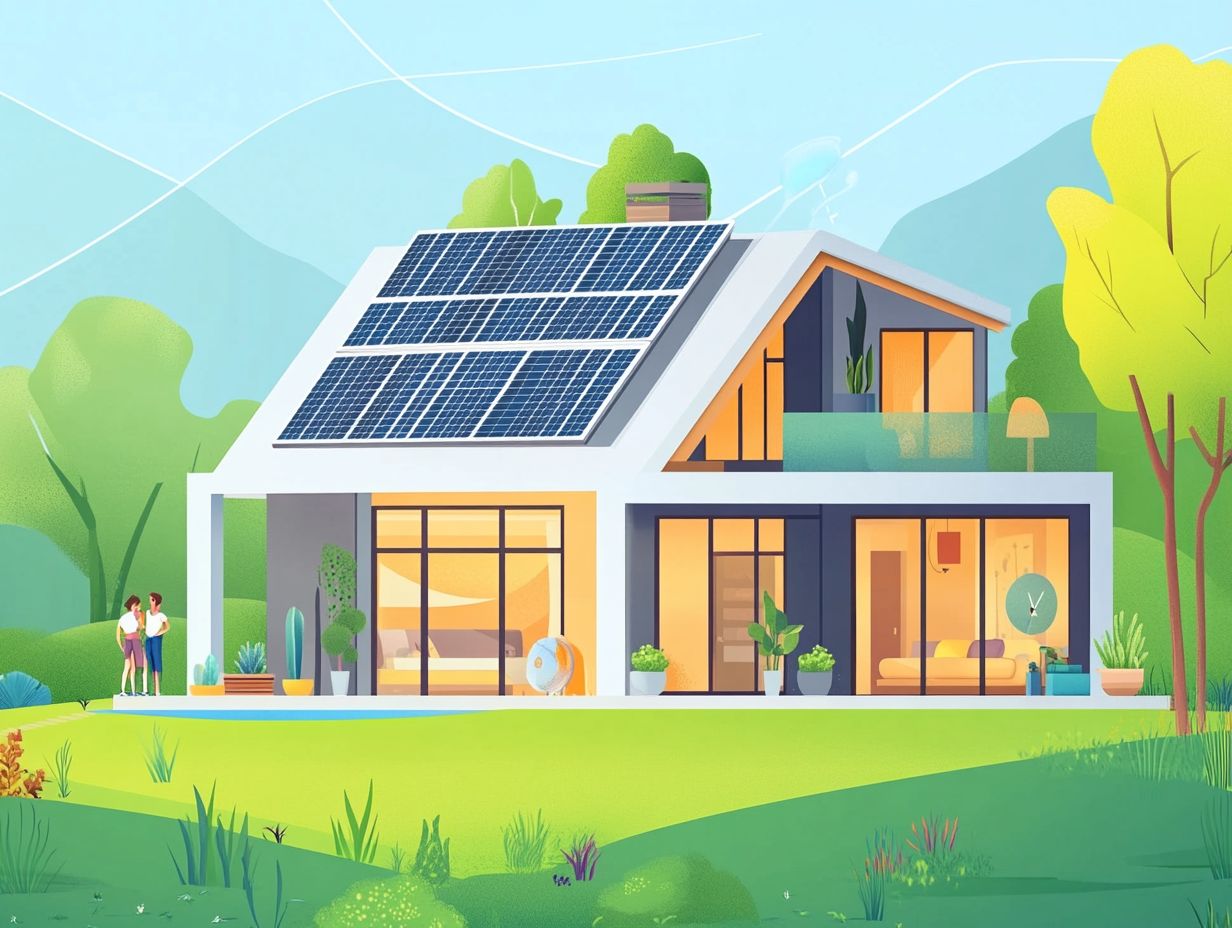
Investing in solar panels provides immediate energy savings while boosting your home s value. This makes your property more appealing in today s competitive real estate market.
Research indicates that homes equipped with solar energy systems can command a premium of up to 4.1% more than similar homes without these installations. This insight comes from a comprehensive study by the Lawrence Berkeley National Laboratory.
More buyers are actively seeking energy-efficient features. Solar installations enhance your property’s appeal by providing reduced utility costs and a lower carbon footprint.
As sustainability grows increasingly important to potential homeowners, the prospect of higher resale values reinforces the notion that solar panels are a wise long-term investment.
Act now to take advantage of government incentives before they change!
4. Government Incentives and Tax Credits
Government incentives and tax credits significantly enhance the affordability of solar energy systems, making this a financially viable option for homeowners like you who want to invest in clean energy technology.
These initiatives often encompass various programs at both the federal and state levels, designed to lower the upfront costs associated with solar installation. You can explore options such as the Federal Investment Tax Credit (ITC), which allows you to deduct a substantial percentage of your installation costs from your federal taxes.
Many states offer their own rebates and grants to minimize your overall expenditure. To fully benefit from these incentives, it’s essential to research eligibility requirements and meticulously follow the application procedures outlined by the respective government entities.
Fortunately, many resources are available online to guide you through every step of the process, ensuring you capitalize on all available opportunities.
5. Energy Independence
Imagine a world where you control your energy! Switching to solar power means you can be self-sufficient, minimizing your reliance on the traditional energy grid and granting you greater control over your energy consumption.
This transition not only leads to significant savings on your energy bills but also enhances your resilience during power outages, as these systems can generate electricity even when the main grid is down.
Harnessing the sun’s energy provides a comforting sense of security, ensuring that your household can continue to function seamlessly, regardless of external circumstances.
Many find peace of mind in knowing that by utilizing solar energy, they are contributing to a more sustainable future, reducing their carbon footprint, and supporting environmental health.
This shift leads to a more sustainable lifestyle.
How Does Solar Energy Work?
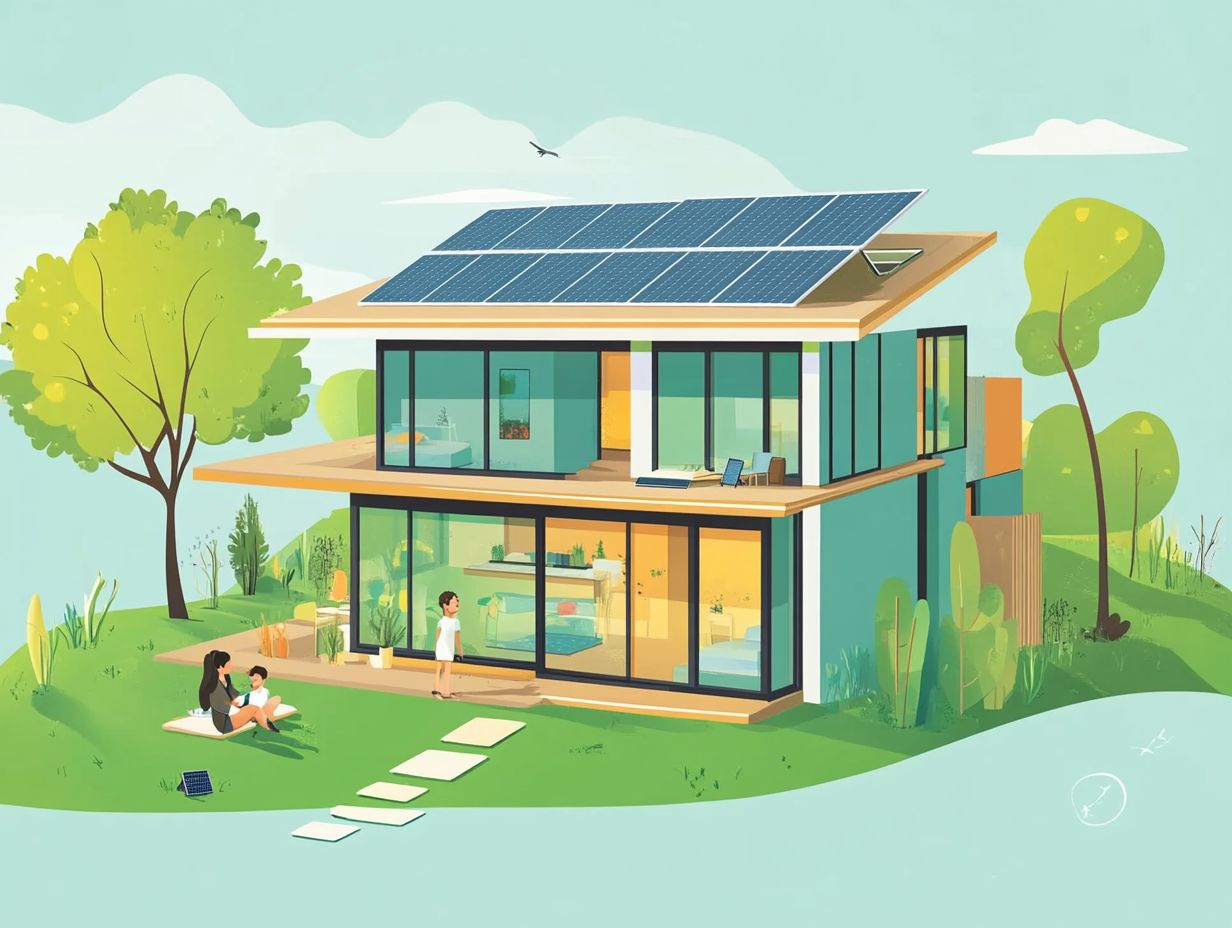
Solar energy systems work through photovoltaic cells that transform sunlight into electricity, allowing you to harness natural resources and enjoy clean, renewable energy for your home or business.
These cells, typically crafted from silicon, absorb photons from sunlight, causing electrons to become excited and generating a flow of electric current.
To make this electricity usable, an inverter plays an important role, converting the direct current (DC) produced by the photovoltaic cells into alternating current (AC), the standard electricity format used in homes.
The efficiency of this energy conversion process is significantly impacted by the intensity and angle of sunlight, highlighting the importance of positioning your solar panels to maximize exposure for optimal energy generation.
What Are the Different Types of Solar Panels?
When exploring the solar panel market, you’ll encounter several types, including monocrystalline, polycrystalline, and thin-film panels. Each comes with distinct efficiencies and applications tailored for solar energy systems. Understanding the unique characteristics of each type is vital if you re considering solar energy.
Monocrystalline panels are renowned for their high efficiency and are often the go-to choice for limited spaces, as they require less area to generate the same energy output compared to others.
Polycrystalline panels are budget-friendly and serve as a great option for larger installations where space isn t as much of a concern.
Then there are thin-film panels, which, while the least efficient, are incredibly versatile and lightweight, making them suitable for unconventional surfaces. Each panel type presents its own advantages and disadvantages, so grasping how efficiency ratings affect overall energy production is crucial for maximizing your return on investment.
What Are the Maintenance Requirements for Solar Panels?
Regular maintenance of your solar panels is essential for ensuring optimal performance and longevity. This involves cleaning, periodic inspections, and monitoring energy output to maximize efficiency.
To keep your solar panels operating at their peak efficiency, schedule cleanings at least two to four times a year, depending on local weather conditions and surrounding vegetation. Dust, debris, and bird droppings can accumulate over time, diminishing their energy-producing capabilities.
Make it a routine to inspect your panels every year! This helps catch any issues early, such as cracks or loose connections, that could hinder performance.
Keep a close eye on your energy output to catch issues quickly! Every drop in performance matters. Taking these proactive steps will not only safeguard your investment but also contribute to a more sustainable energy future.
What Are the Common Misconceptions About Solar Energy?
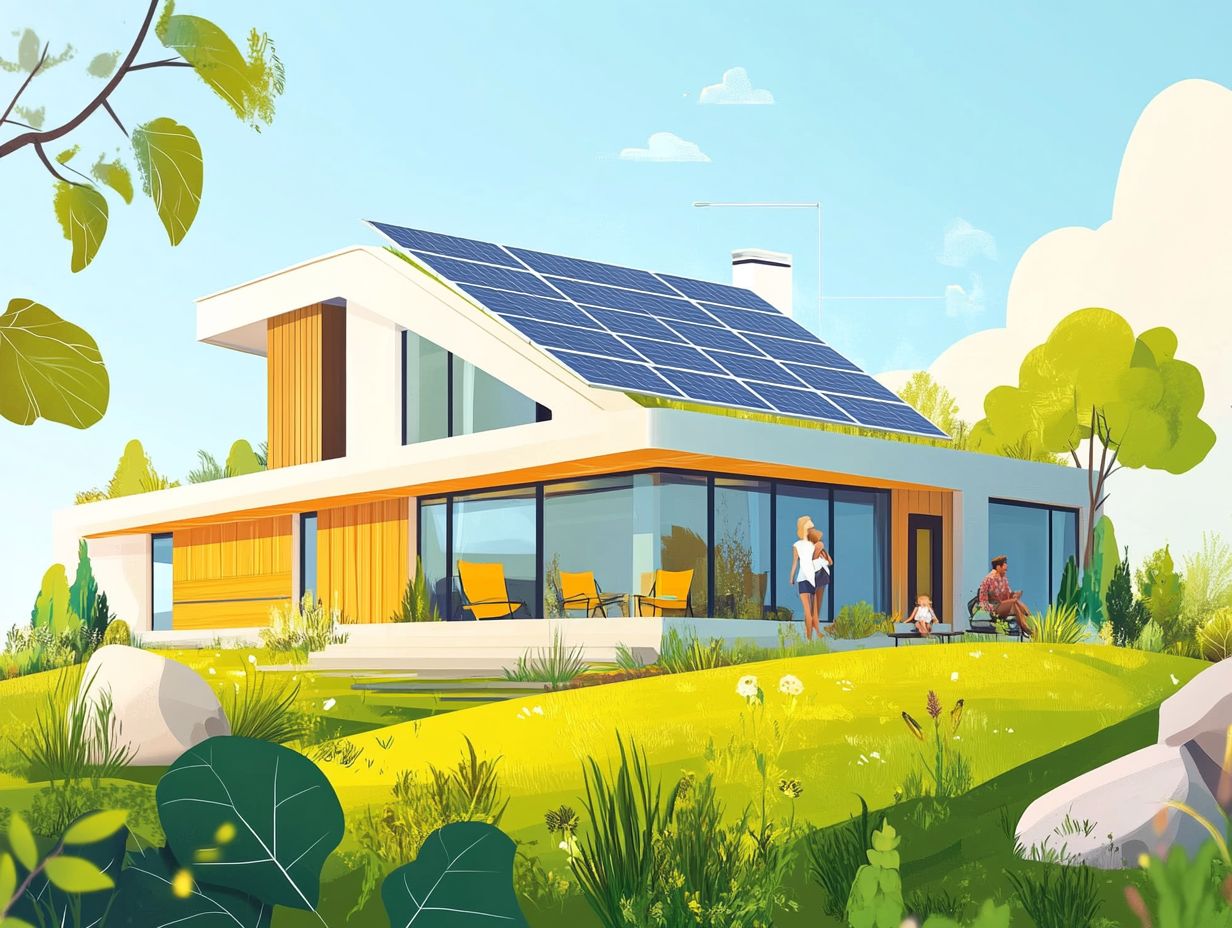
Many common misconceptions about solar energy can lead to confusion, especially myths surrounding its cost, efficiency, and suitability for various climates. It s essential to address these with factual information.
For example, one prevalent myth suggests that solar panels are prohibitively expensive. In reality, advancements in technology and generous tax incentives have significantly lowered their initial costs, making them much more accessible.
Many believe that solar energy is only for homes. However, research indicates that solar panels can generate substantial energy even under overcast skies, making them effective in less sunny regions.
Additionally, businesses and large infrastructures stand to gain immensely from solar installations, resulting in lower energy costs and enhanced sustainability.
By closely examining these myths, you can cultivate a clearer understanding of solar energy s vast potential.
Is Solar Energy Right for You? Find Out Now!
You can determine if solar energy is the right fit for you by carefully evaluating your energy needs, roof orientation, available sunlight, and financial considerations to ensure a personalized approach to solar adoption.
Start by reviewing your energy use patterns this can often reveal peak usage times and highlight potential areas where you could save. Next, take a close look at your roof space; a clear, unshaded area is ideal for maximizing energy absorption.
It s also wise to explore local regulations and incentives, as these factors can significantly impact the feasibility of installing solar panels.
As you proceed, consider the long-term financial benefits, including potential savings on your electricity bills and available tax credits. This will help you make a well-informed decision that aligns seamlessly with your budget and lifestyle.
Take the first step towards a sustainable future today! Contact a solar expert for personalized advice.
What Are the Long-Term Benefits of Investing in Solar Energy?
Investing in solar energy offers big savings on utility bills and increases your property value while helping the environment by reducing carbon emissions.
By harnessing the sun’s power, you can see a dramatic drop in monthly energy costs, often enjoying a payback period of just a few years. An average household can save thousands over the lifespan of its solar panel system, turning an initial investment into a valuable asset.
Homes with solar energy systems often have higher market values and attract eco-conscious buyers, boosting your overall investment potential.
Investing in solar energy is a great fit for sustainability goals, contributing to cleaner air and creating a healthier planet for future generations.
Frequently Asked Questions
- What are the 5 advantages of solar energy for homeowners?
- Reduced electricity costs: Solar energy can significantly lower your electricity bills. By harnessing sunlight, homeowners can generate their own electricity and rely less on traditional sources.
- Environmentally friendly: Solar energy is a clean and renewable resource that produces no harmful emissions. This helps reduce your carbon footprint and protects the environment.
- Increased home value: Installing solar panels can raise your home’s value and make it more appealing to buyers. Many homebuyers are willing to pay a premium for homes with solar systems.
- Independence from the grid: Solar energy allows homeowners to be more self-sufficient and less dependent on the power grid, especially helpful during outages or emergencies.
- Government incentives: Many governments provide incentives like tax credits and rebates for homeowners who switch to solar energy, helping to offset installation costs.
- How long do solar panels last? On average, solar panels last 25-30 years. Some manufacturers offer warranties for up to 25 years, guaranteeing energy production. With proper maintenance, they can generate electricity even longer.
- Will solar panels work in all climates? Solar panels operate in all climates, using sunlight to produce electricity rather than heat. They are often more efficient in cooler temperatures but might generate a bit less electricity in areas with heavy cloud cover.
- Are there any maintenance costs for solar panels? Solar panels need little maintenance, but it’s recommended to clean them every 6-12 months for optimal performance. You can do this easily with a hose or hire professionals. Some solar companies also offer maintenance plans for a fee.
- Do I need a lot of space to install solar panels? No, you do not need a lot of space. Most residential solar systems can be installed on rooftops or in small yards. The number of panels required will depend on your energy use and home size.
Explore solar options today to start saving!

